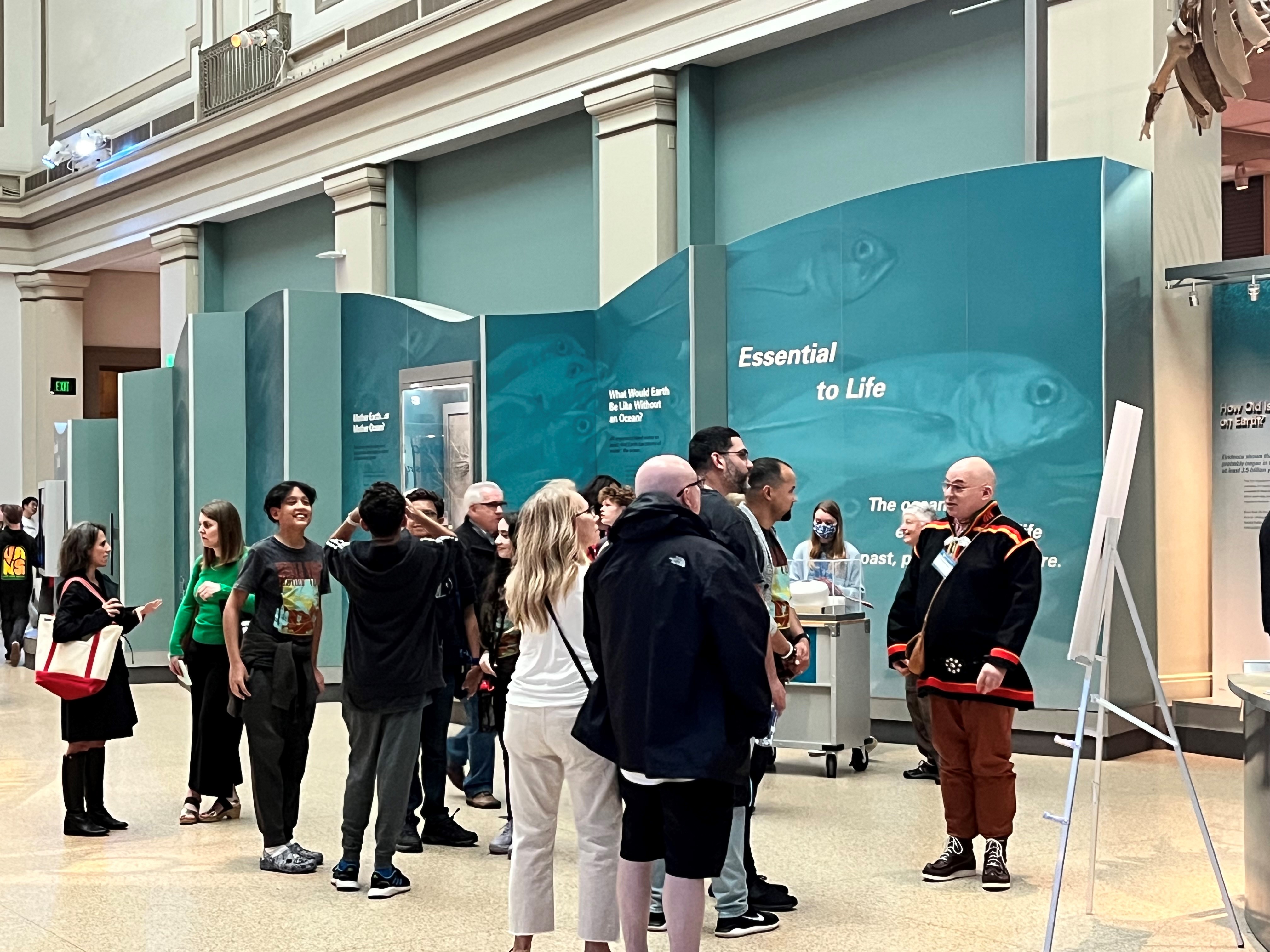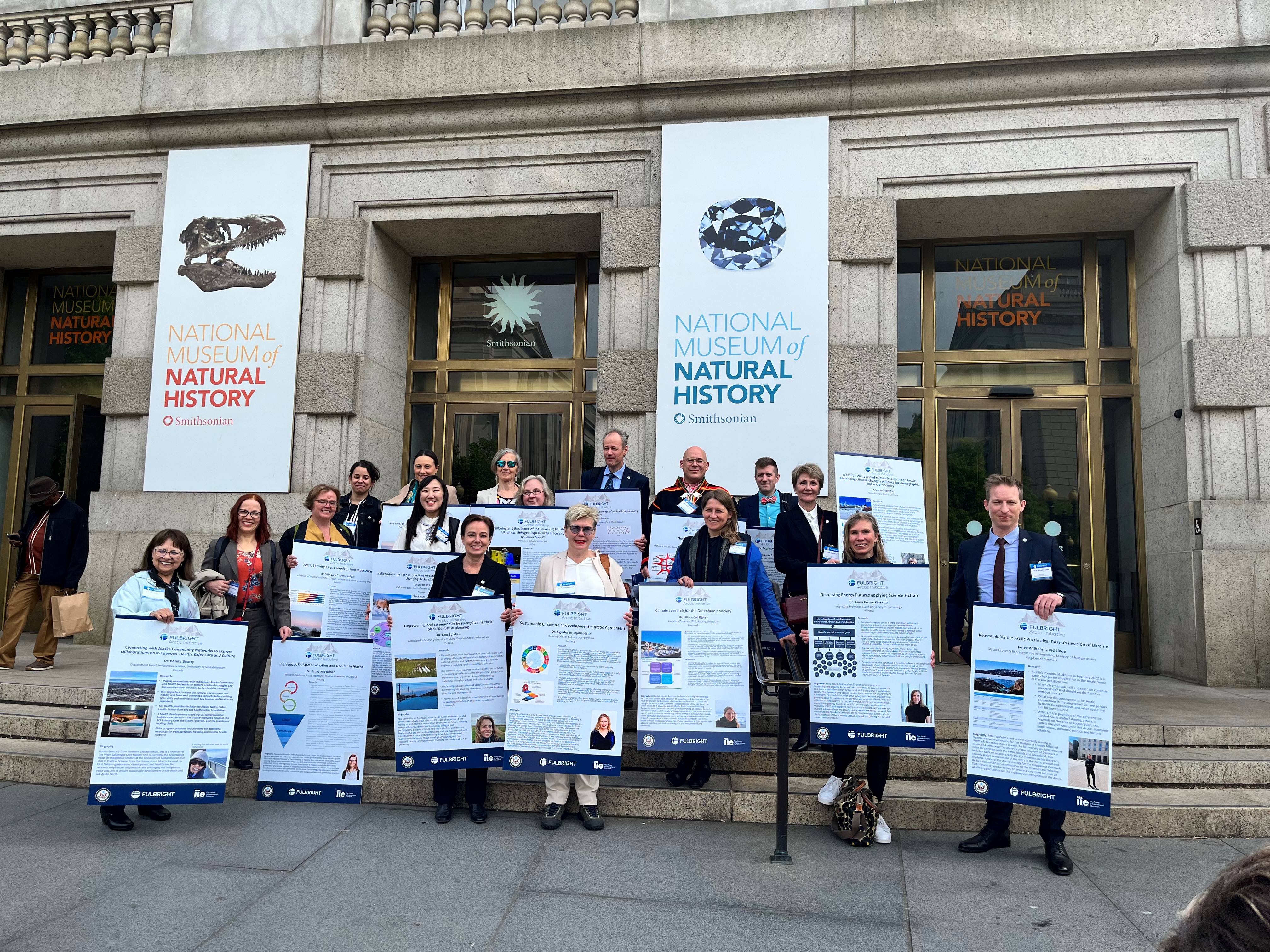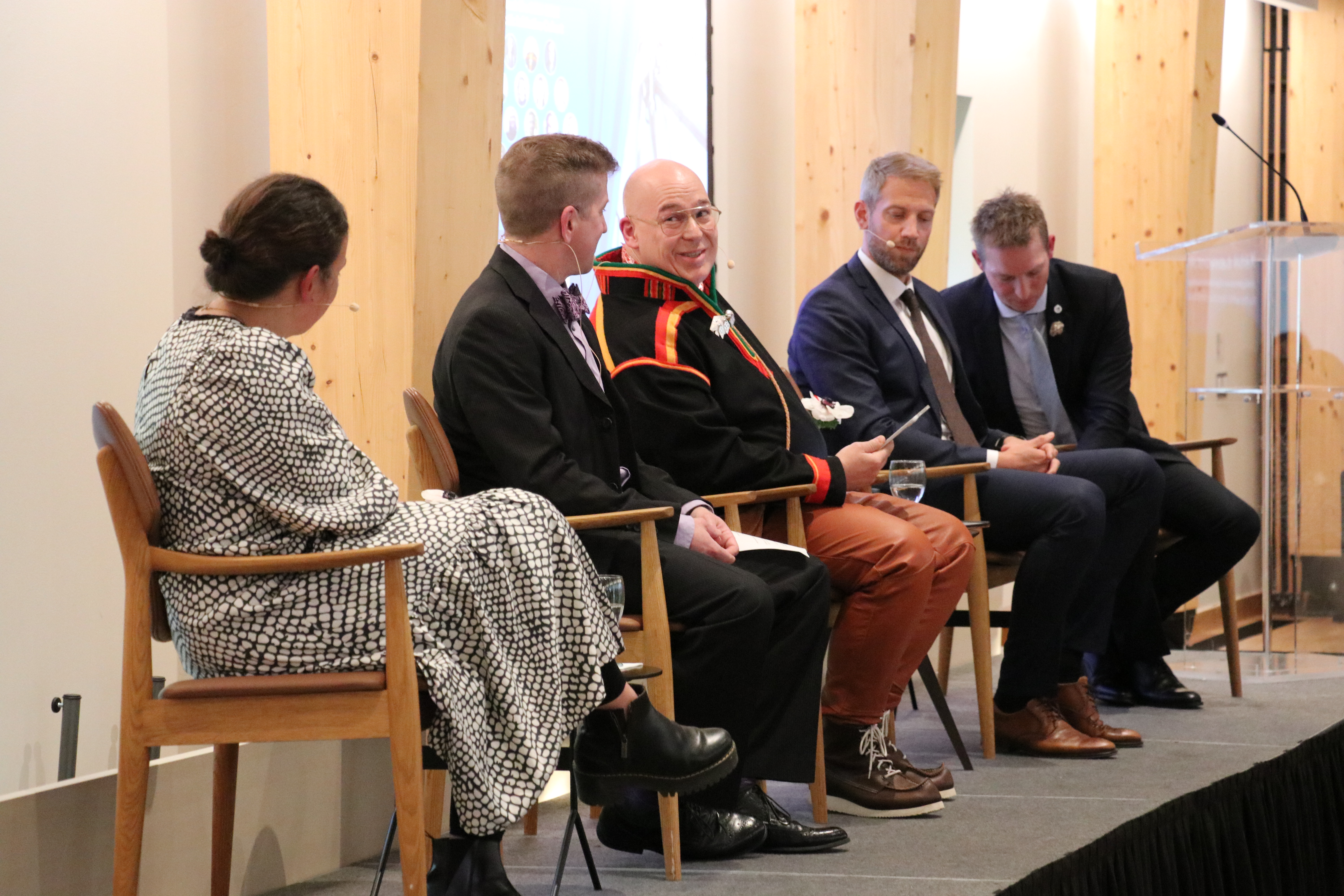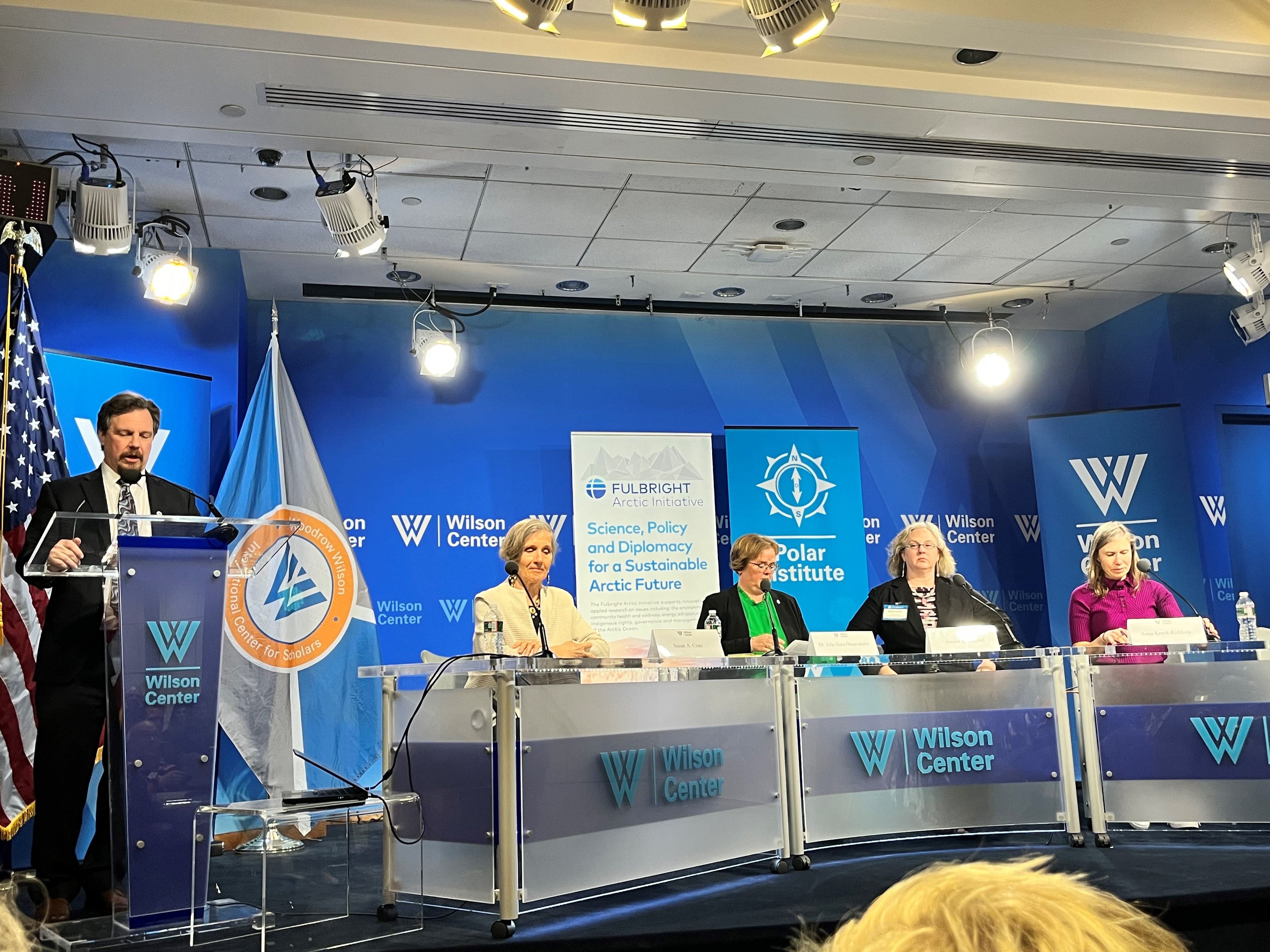The Fulbright Arctic Initiative (FAI), a component of the Fulbright Scholar Program, promotes international, multi-disciplinary collaboration on Arctic research. FAI was launched in 2015 to support international scientific cooperation on Arctic issues and increase mutual understanding between the people of the United States and the people of other Arctic nations.
For a week from April 25 to April 28, dubbed “Fulbright Arctic Week,” the third cohort of FAI Scholars from all Arctic nations, including the United States, Canada, the Kingdom of Denmark (including Greenland and the Faroe Islands), Finland, Iceland, Norway, Russia and Sweden, took part in a series of events in Washington, D.C., capping two years of collaborative research in the areas of Arctic security, infrastructure, and health. The group was led by two co-lead scholars, Dr. Greg Poelzer of the University of Saskatchewan and Dr. Elizabeth Rink of Montana State University, who provided intellectual leadership throughout the program.
Tuesday, April 25 – U.S. Government Briefings and Public Exhibition at the Smithsonian
On their first day in Washington, Arctic Initiative Scholars had an opportunity to meet with government representatives from the U.S. Department of State and other U.S. federal agencies with stakes in arctic policy. Scholars were able to share the highlights of their research and respond to questions about its implications for U.S. government policy moving forward.
Subsequently, the scholars presented their research to members of the public with a formal poster exhibition hosted by the Smithsonian Museum of Natural History.
Fulbright Arctic Week coincided with the meetings of the Standing Committee of Parliamentarians of the Arctic Region which offered an opportunity for the FAI Scholars to meet with representatives from other Arctic Council nations at a reception hosted by the Embassy of the Kingdom of Denmark. A welcome was provided by Alaska Senator Lisa Murkowski.
Norwegian scholar Ketil Lenert Hansen presents his research on the community dimensions of health to visitors at the Smithsonian National Museum of Natural History.
The FAI Scholars with their posters in front of the Smithsonian National Museum of Natural History.
Wednesday, April 26 – Panel Presentations by Fulbright Scholars and Officials from Arctic Nations, Hosted by the Embassy of Norway
On Wednesday, the Royal Norwegian Embassy hosted an event titled “Cooperation in a Changing Arctic,” featuring the FAI Scholars as well as national leaders in Arctic policy. The event included introductory remarks by Norwegian Ambassador Anniken Krutnes, Deputy Assistant Secretary of State for Academic Programs Ethan Rosenzweig, and FAI’s Co-Lead Scholar Dr. Poelzer. The first panel highlighted the work of the FAI Scholars from Norway and U.S. Scholars who went to Norway on exchanges. The second panel featured a series of speakers on arctic policy including Ambassador Krutnes, Senator Murkowski, Department of Defense Deputy Assistant Secretary for Arctic and Global Resilience Iris Ferguson, Executive Director of the Arctic Executive Steering Committee at the White House’s Office of Science and Technology Policy Ambassador David Balton, and Chair of the Standing Committee of Parliamentarians of the Arctic Region Aaja Chemnitz. The panel was moderated by Dr. Mike Sfraga, Chair of the U.S. Arctic Research Commissions and U.S. Ambassador Designate for the Arctic Region.
To the Fulbright Arctic Initiative Scholars, Dr. Sfraga said: “When I look at [you] and the work that [you] are doing, I see tomorrow; I see a bright future in the Arctic. The work that you do is important…. That work flows to these discussions and informs what officials and policymakers say on this stage, discussions in the North, and the ones who are involved in the conversation outside of the Arctic.”
A panel of FAI Scholars at the Royal Norwegian Embassy.
Thursday, April 26 – Presentation of Policy Recommendations, Hosted by the Wilson Center
Thursday marked the culmination of the scholars’ week in Washington as they presented their policy recommendations at the Wilson Center to a live audience and through a simulcast to the rest of the world. The event, titled “Interdisciplinary Scholars and Policy: Science Diplomacy in the Arctic,” was hosted by the Wilson Center’s Polar Institute, and introduced by Dr. Sfraga.
The presentation was structured following the primary areas of policy focus for the Fulbright Arctic Initiative: arctic security and cooperation, community dimensions of health, and arctic infrastructure in a changing environment.
The presentation was followed by a panel highlighting the work of the FAI Scholars from indigenous communities across the Arctic, including two Sami scholars, one from the Republic of Sakha, a member of the Peter Ballantyne Cree Nation, and one from the Lutsel K’e Dene First Nation. The panel was introduced by FAI Co-lead Scholar Dr. Rink.
FAI’s research group on Arctic security and community engagement presents its policy brief at the Wilson Center.
The policy brief produced by this iteration of the Fulbright Arctic Initiative, as well as information on the previous program cohorts, is available to the public at https://fulbrightscholars.org/arctic.
About the Fulbright Arctic Initiative
The Fulbright Arctic Initiative is an international, multi-disciplinary collaboration on Arctic research. Launched in 2015, the Fulbright Arctic Initiative supports international scientific cooperation on Arctic issues and increases mutual understanding between the people of the United States and the people of other countries. As Arctic nations continue to take concrete steps to work together and address public-policy research questions relevant to their shared challenges and opportunities, the Fulbright Arctic Initiative offers a collaborative model for scholarly exchange. The nineteen scholars who participated in the most recent program represent the eight countries that make up the Arctic Council: Canada, the Kingdom of Denmark (including Greenland and the Faroe Islands), Finland, Iceland, Norway, Russia, Sweden, and the United States.
The Fulbright Arctic Initiative is part of the Fulbright Program, the U.S. government’s flagship international educational exchange program, which is funded through an annual appropriation made by the U.S. Congress to the U.S. Department of State’s Bureau of Educational and Cultural Affairs. Participating governments and host institutions, corporations, and foundations around the world also provide direct and indirect support to the Program. Since 1946, the Fulbright Program has provided more than 400,000 participants from more than 160 countries with the opportunity to study, teach and conduct research, exchange ideas and contribute to finding solutions to shared international concerns. The Fulbright Arctic Initiative forges lasting connections among the Arctic scholars and their nations as they work together toward common goals.
The Fulbright Program and the Fulbright Arctic Initiative are programs of the U.S. Department of State, with funding provided by the U.S. government and partner governments, including the governments of Canada, the Kingdom of Denmark, and Iceland.






